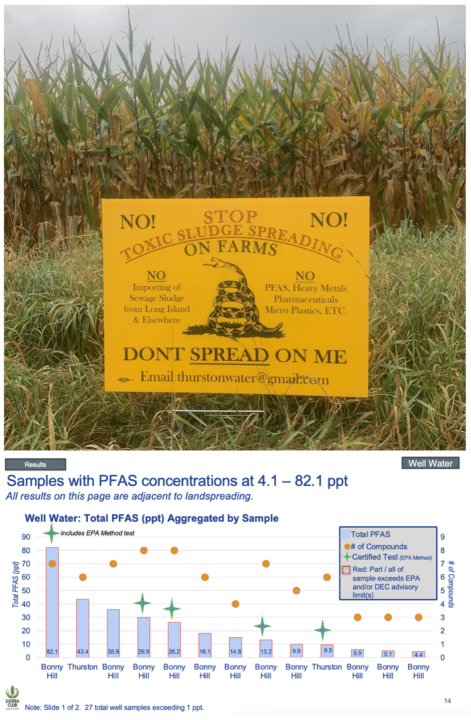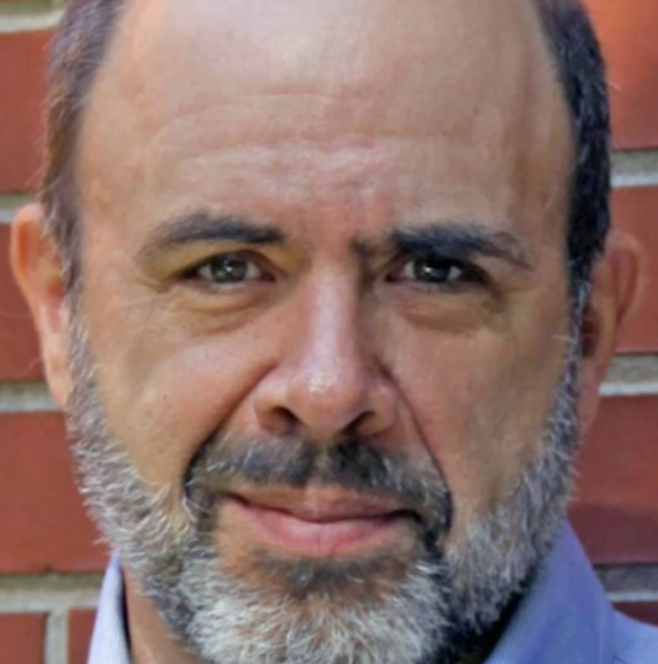A unit of Casella Waste Systems Inc. filed suit late yesterday against the Town of Thurston to try to block enforcement of a new local law that bans the spread of municipal sewage sludge on certain Steuben County fields.
The Vermont-based company that operates landfills and composting facilities across New York and New England alleges that Thurston’s law violates the state’s Right to Farm law as well as state solid waste policy.
The suit asks a Steuben County Supreme Court judge to invalidate the law and prevent it from being enforced.


Thurston enacted its Local Law No. 3 in October, citing concerns that the state has been too lax in regulating PFAS ‘forever chemicals’ in sewage sludge, allowing widespread contamination of crops and groundwater around sludge-spread fields.
Members of the Thurston Town Board have noted that Maine banned the spread of sewage sludge statewide in response to devastating PFAS pollution that ruined milk and crops, forcing several farms to shut down.
But Casella’s suit claims the town acted “without the benefit of any bona fide testing or analysis linking land application of biosolids (the state’s term for sewage sludge) to PFAS contamination.”
The suit also cited Casella’s concern that “if the ban is upheld … other municipalities will follow suit … further prohibiting the use of organics (another euphemism for sewage sludge) to enhance farming operations throughout Steuben County.”
Furthermore, the suit said, the ban would inflict economic harm on local farms because they would need to substitute expensive chemical fertilizers for sludges to maintain crop yields.
The lead plaintiff in the lawsuit is New England Waste Services of M.E., Inc., a Casella subsidiary. Other plaintiffs include Leo Dickson & Sons Inc. and related farming entities in Thurston.
The Dickson family has been spreading municipal sludge on its fields for several decades.
Casella acquired the Dickson sludge operation in July 2022 for $2 million, according to the lawsuit. That transaction involved the purchase of 150 acres on which the main facility is located and leases on another 2,700 acres of fields.
The state Department of Environmental Conservation has since transferred the state permit to spread sludge from the Dickson organization to Casella, which has renamed its operation Bonny Hill Organics.
Casella did not immediately notify local officials when it acquired the Dickson facility, and Thurston officials didn’t learn about the deal until many months later. They initially assumed — incorrectly, Casella says — that the company planned to establish a new landfill on the site.
Casella has insisted it only wants to spread sludge. A senior company official apologized to the town board for leaving it in the dark about its quiet presence in the town.
The DEC has long allowed the Dickson family to accept sludge from more than two dozen sewage treatment plants in and around the Southern Tier region. But Casella is seeking the state’s permission to import from a huge sewage plant on Long Island, which produces as much or more sludge than all the smaller regional plants combined. An application for that permit is pending.
In order to gauge the potential PFAS contamination on Dickson fields that have long been spread with sludge, Sierra Club volunteers took samples for testing to independent laboratories. They were acting on behalf of the town board.
The lawsuit is dismissive about both the test process and its results.
“The testing on which the town relies … is from in-home test kits utilized by third parties,” the suit alleges. “The town has provided no testing results from state-certified laboratories (or laboratories approved by DEC) supporting the town’s claim of adverse impact due to PFAS.”
But that testing included results for Eurofin Labs, which is certified by the state Department of Health, according to Elizabeth Donderewicz, coordinator of the Sierra Club testing program.
Tests of 83 sites in Thurston, Cameron and Bath found that water wells, ponds and streams adjacent to fields spread with sewage sludge had average PFAS levels nine times higher than sites not adjacent to spread fields.
The vast majority of those tests results were provided by non-certified labs. However, the highest single PFAS result and five of the highest 10 PFAS results were processed by Eurofin, the certified lab.
Donderewicz has made presentations of her findings to the Thurston Town Board, the Steuben County Legislature and the Cameron Town Board.
During her presentation to Cameron officials Wednesday, Casella’s Larry Shilling stated that Casella was preparing notify Thurston that it was about to be sued.
The lawsuit alleges that Local Law No. 3 conflicts with the state’s Right to Farm law, its 2019 climate law and the state’s solid waste policy.
“There can be no doubt,” the complaint states, “that the Commissioner of Agriculture and Markets has exclusive jurisdiction to determine if local enactments run afoul of the protections accorded farm operations in agricultural districts …”
It goes on to allege that Local Law 3 conflicts with the 2019 CLCPA (Climate Leadership and Community Protection Act), which mandates reductions in greenhouse gas (GHG) emissions statewide. The local law would cause more sludge to be sent to landfills, Casella argues, driving up their GHG emissions. The suit does not explain how sending sludge to landfills would create more net GHG emissions than spreading it on farm fields.
Casella also alleges that the Thurston sludge ban is at odds with the state’s latest solid waste management plan, which seeks to recycle 85 percent of the state’s solid waste stream by 2050.
A crucial element of that plan is a projected major increase in the spreading of municipal sewage sludge on farm fields.
“Local Law No. 3 is, therefore, in direct conflict with state policy and, thus, conflict-preempted by state law,” the lawsuit argues. “Local Law No. 3, therefore, must be annulled and its enforcement permanently enjoined.”
The lawsuit names as defendants the Town of Thurston and its Town Board. Casella is represented by Albany attorney Thomas S. West. The Dickson entities are represented by Ari M. Goldberg of the law firm Barclay Damon.
The Town of Thurston has retained Earthjustice, which is expected to defend in the case.
Thurston Town Supervisor Michael Volino declined to comment on the lawsuit.

